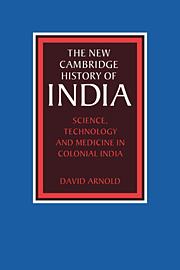Book contents
- Frontmatter
- 1 Introduction: science, colonialism and modernity
- 2 Science under the company
- 3 Western medicine in an Indian environment
- 4 Technologies of the steam age
- 5 Imperial science and the Indian scientific community
- 6 Science, state and nation
- Conclusion
- Biographical notes
- Bibliographical essay
- Index
- THE NEW CAMBRIDGE HISTORY OF INDIA
- References
1 - Introduction: science, colonialism and modernity
Published online by Cambridge University Press: 28 March 2008
- Frontmatter
- 1 Introduction: science, colonialism and modernity
- 2 Science under the company
- 3 Western medicine in an Indian environment
- 4 Technologies of the steam age
- 5 Imperial science and the Indian scientific community
- 6 Science, state and nation
- Conclusion
- Biographical notes
- Bibliographical essay
- Index
- THE NEW CAMBRIDGE HISTORY OF INDIA
- References
Summary
The questions that can be asked about science in modern India are essentially those pertaining to the history and sociology of science elsewhere. What is the social character of scientific knowledge? Who produces science and why? How does science exercise authority within a society and across cultural divides? As historians and sociologists have begun to investigate science, less in terms of its self-declared aims and putatively objective interrogation of nature and more in terms of its internal ordering, social construction and cultural authority, it has become clear that science is ‘a highly social activity’, one that cannot be ‘sealed off from the values of the society in which it is practised’. It is increasingly recognised, too, if not yet universally accepted, that science, far from being monolithic, manifests itself across time and cultures in myriad forms, reflecting as much as informing a given society’s cultural, economic and political modalities. Science thus ‘reveals itself as much more contingent and culturally specific’ than it was once assumed to be. Individuals and groups produce scientific knowledge not in isolation but ‘against the back-ground of their culture’s inherited knowledge [and] their collectively situated purposes’ as well as through ‘the information they receive from natural reality’.
The social character and cultural plurality of science has a particular bearing on the history of science, technology and medicine in India, which had a well-established scientific and technological tradition of its own long before being subjected to an extended period of European colonial rule. Although the history of science, technology and medicine continues to be presented in general histories as a record of Western discovery and dissemination, it has become more widely acknowledged than a generation or two ago that not all such histories can be conflated into a single story of European achievement or saga of European enterprise overseas.
- Type
- Chapter
- Information
- Science, Technology and Medicine in Colonial India , pp. 1 - 18Publisher: Cambridge University PressPrint publication year: 2000



